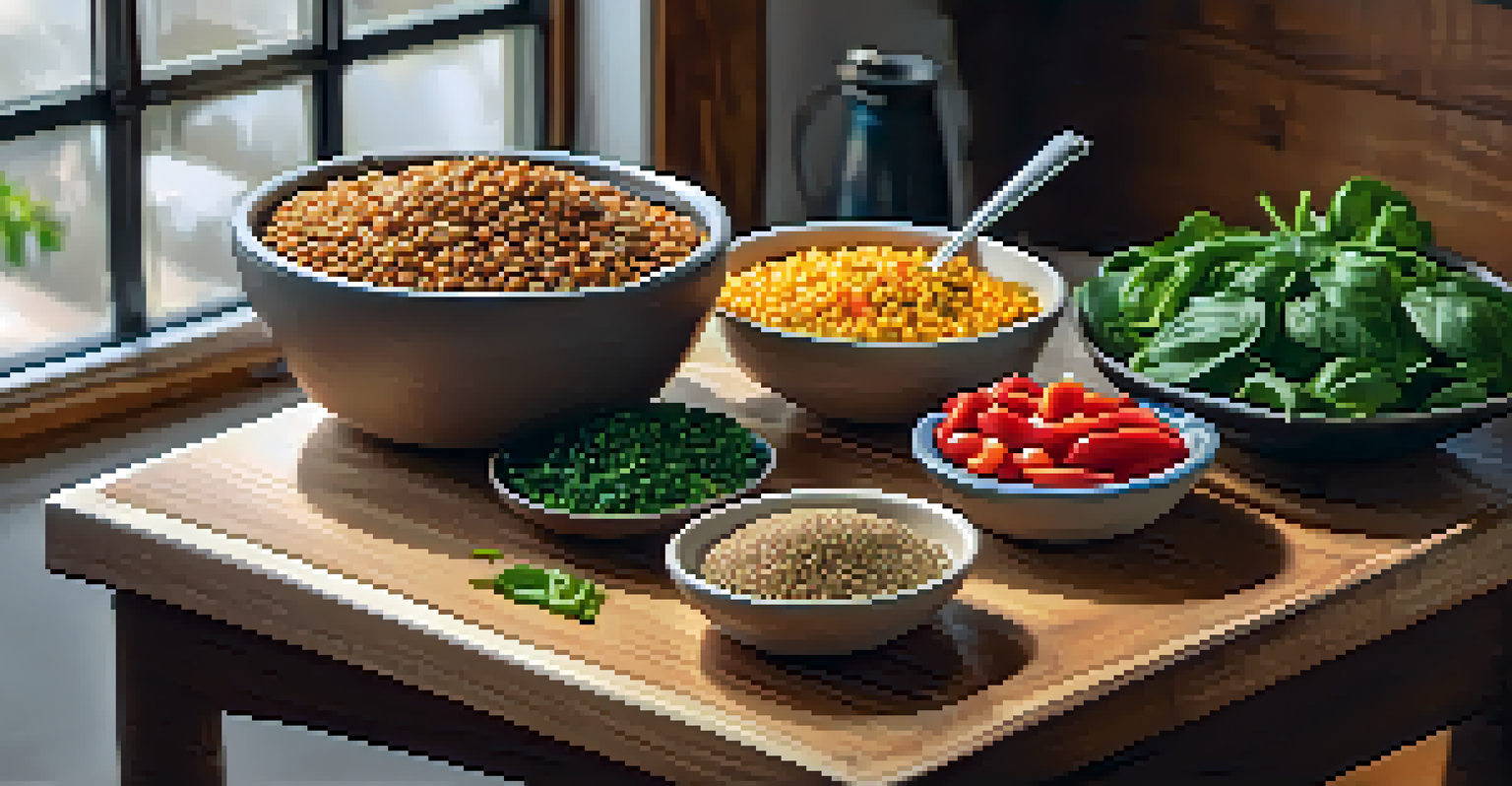Key Nutrients for Vegan Athletes: Fueling Your Workouts

Understanding the Vegan Athlete's Nutritional Needs
Vegan athletes have unique nutritional requirements that differ from their omnivorous counterparts. With a plant-based diet, it's essential to ensure you're getting all the necessary nutrients to support your workout regimen. Understanding the fundamentals of nutrition can help athletes make informed choices that enhance performance and recovery.
Let food be thy medicine and medicine be thy food.
A well-balanced vegan diet can provide all the essential macronutrients—carbohydrates, proteins, and fats—along with vital micronutrients. This balance is key to fueling workouts and promoting overall health. By focusing on whole foods, vegan athletes can optimize their nutrition and meet their physical demands.
It's important to recognize that some nutrients may be less abundant in plant foods, which means vegan athletes need to be proactive in their dietary choices. This article will explore the key nutrients that are crucial for fueling workouts and how to incorporate them effectively into a vegan diet.
Protein: The Building Block for Muscle Recovery
Protein is often at the forefront of conversations about sports nutrition, and for good reason. It's essential for muscle repair and growth, especially after intense workouts. Vegan athletes should focus on high-quality plant-based protein sources to ensure they're meeting their needs.

Foods like lentils, chickpeas, quinoa, and tofu are excellent sources of protein. Combining different protein sources can also help achieve a complete amino acid profile, which is important for muscle recovery. For example, pairing rice and beans creates a complete protein that can rival animal sources.
Vegan Diet Supports Athletic Performance
A well-balanced vegan diet provides essential macronutrients and micronutrients that fuel workouts and enhance recovery.
Incorporating protein-rich snacks like edamame or protein smoothies with pea protein can help athletes meet their protein goals. By being mindful of protein intake, vegan athletes can support their muscle recovery and optimize their performance.
Iron: Boosting Energy Levels for Optimal Performance
Iron is a crucial mineral for athletes, as it plays a key role in oxygen transport and energy production. Vegan athletes may be at a higher risk of iron deficiency, as plant-based sources of iron are less readily absorbed by the body compared to animal sources. Understanding how to effectively incorporate iron into a vegan diet is vital.
You are what you eat, so don't be fast, cheap, easy, or fake.
Good plant-based sources of iron include lentils, spinach, quinoa, and fortified cereals. To enhance iron absorption, pairing these foods with vitamin C-rich options—like citrus fruits or bell peppers—can significantly improve uptake. This simple addition can make a big difference in energy levels during workouts.
Regularly monitoring iron levels is important for athletes, especially those on a vegan diet. A well-planned approach to iron intake can help maintain energy and support performance, ensuring that vegan athletes can push their limits without fatigue.
Omega-3 Fatty Acids: Supporting Joint and Heart Health
Omega-3 fatty acids are essential for reducing inflammation and supporting heart health, making them a key nutrient for athletes. While these fatty acids are commonly found in fish, vegan athletes can obtain them from plant-based sources like flaxseeds, chia seeds, and walnuts. Incorporating these foods into your diet can help you reap the benefits of omega-3s.
For those who find it difficult to get enough omega-3s from food alone, algae-based supplements are a great alternative. These supplements provide a direct source of DHA and EPA, the active forms of omega-3s that are often lacking in a vegan diet. Regular intake can lead to improved joint health and faster recovery.
Key Nutrients for Vegan Athletes
Vegan athletes must prioritize nutrients like protein, iron, omega-3s, calcium, zinc, and vitamin B12 to support their performance and health.
Adding omega-3-rich foods to smoothies, oatmeal, or salads can be an easy way to boost your intake. By prioritizing omega-3s, vegan athletes can support their overall health and improve their physical performance.
Calcium: Essential for Bone Health and Muscle Function
Calcium is another critical nutrient for vegan athletes, as it plays a vital role in bone health and muscle contraction. Many people associate calcium with dairy products, but there are plenty of plant-based options available. Leafy greens, fortified plant milks, and almonds are all great sources of calcium.
To ensure adequate calcium intake, it's important to incorporate a variety of these foods into your daily meals. For instance, a smoothie made with kale and fortified almond milk can provide a significant calcium boost. Understanding your calcium needs can help maintain strong bones and prevent injuries.
Regular consumption of calcium-rich foods not only supports bone health but also aids in muscle function during workouts. By focusing on calcium as part of a balanced diet, vegan athletes can enhance their performance and overall well-being.
Zinc: A Vital Nutrient for Immune Function
Zinc is essential for immune function and plays a role in protein synthesis, making it a key nutrient for athletes. Without adequate zinc, athletes may find it harder to recover from workouts and could be more susceptible to illness. Vegan sources of zinc include beans, lentils, nuts, and whole grains.
Incorporating a variety of zinc-rich foods into your diet helps ensure you're meeting your daily needs. For example, snacking on pumpkin seeds or adding chickpeas to a salad can be effective ways to boost zinc intake. It's important to remember that phytates in plant foods can inhibit zinc absorption, so soaking or sprouting grains and legumes can be beneficial.
Hydration is Crucial for Success
Proper hydration, along with consuming hydrating foods, is essential for maintaining energy levels and optimizing athletic performance.
Monitoring zinc levels is especially important during periods of intense training. By prioritizing zinc-rich foods, vegan athletes can support their immune system and enhance recovery.
Vitamin B12: The Key to Energy and Metabolism
Vitamin B12 is crucial for energy production and metabolism, but it's primarily found in animal products. This makes it a vital nutrient for vegan athletes to pay attention to, as a deficiency can lead to fatigue and decreased performance. Fortified foods and supplements are essential for ensuring adequate B12 intake.
Foods like nutritional yeast, fortified cereals, and plant milks can provide a good source of vitamin B12. Consuming these foods regularly can help maintain energy levels during workouts and support overall health. For many vegans, a B12 supplement may also be necessary to meet daily requirements.

Being aware of B12 levels is key for sustaining energy and optimal performance. With proper planning, vegan athletes can ensure they are getting enough vitamin B12 to keep their energy levels high.
Hydration: The Overlooked Essential for Peak Performance
Hydration is often an overlooked aspect of athletic performance, yet it's crucial for maintaining energy levels and optimizing workouts. Vegan athletes should ensure they are drinking enough fluids, especially during intense training sessions. Water is essential, but incorporating hydrating foods can also contribute to overall fluid intake.
Fruits and vegetables like watermelon, cucumbers, and oranges not only provide hydration but also deliver essential vitamins and minerals. This combination can enhance an athlete's performance and support recovery. It's important to listen to your body and adjust fluid intake based on activity level and climate.
Monitoring hydration levels can help prevent fatigue and enhance performance during workouts. By prioritizing hydration, vegan athletes can fuel their bodies effectively and maintain peak performance.